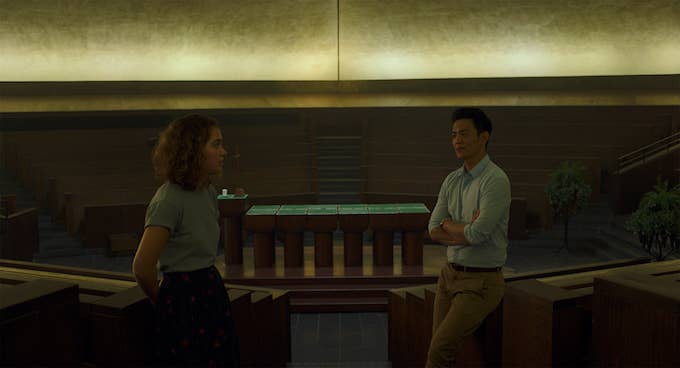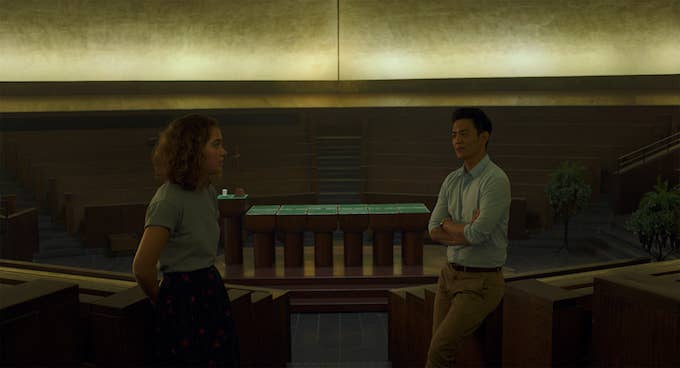
From American Pie, to the Harold and Kumar franchise, to the Star Trek reboot, to the short-lived Selfie—two decades into his acting career, John Cho is finally getting the type of lead roles that audiences have been waiting (and campaigning) for.
Cho’s latest film, Columbus, comes out on Friday. The story revolves around Jin (Cho), the estranged son of a famous architecture professor, who works as a translator for a publisher in Korea. When his father suddenly falls into a coma, Jin quickly returns to the U.S. to be near him, in spite of their distant relationship. There, he strikes an unlikely friendship with Casey (Haley Lu Richardson), a young architecture enthusiast who has decided to forego college so that she can watch over her recovering mother.
Directed by first-time director Kogonada, the film is a quiet and melancholic exploration of human emotions when it comes to family and loss—utilizing the many architectural landmarks of the titular Indiana town, including those by Eero Saarinen and I.M. Pei, as its backdrop. Cho seemingly pierces the screen with a brooding intensity, as the visitor who wanders through the buildings and landscape in search of inner peace.
The 45-year-old actor recently spoke with Complex about how he went from MILF Guy #2 to Jin, why he doesn’t want to be an “activist” for better Asian American representation, and what goes on in his mind before he decides on his next role.
Kogonada said that while they were casting the lead role, one of his initial concerns was that he had never seen you in such a role—the film does seem more serious and pensive than your other work. What drew you to Columbus?
Well, I just thought it was a brilliant script, first off. It was explicitly artistic, the characters talking about art all the time—I thought it was so unusual. Then I saw [Kogonada’s] work, and was so moved by his work, and then I met him, and had such an affinity and such a kinship with him, that I really wanted to do it.
And I can certainly understand his hesitation—I am MILF Guy #2 from American Pie—so you’re always, as an actor, carrying your history to your next role, whether you like it or not.
I read that you felt your character in Selfie was closest to your actual self—is Jin, your character in Columbus, more or less similar?
Um, boy, that’s tough. I felt spiritually close to Jin, and yet he’s much more reserved than I am—I’m much more liable to shoot my mouth off. I think he’s more careful, but I feel close to him. I just don’t know if you’d peg us as doppelgängers. Although, we do bear a striking resemblance.
The film is about the bond between children and parents, and the burden it is for children to uphold that bond sometimes. Now in your mid-forties, can you still feel or relate to this burden?
Of course, yeah. In fact, it can… you must be young.
I’m 25.
It intensifies as you get older, because it’s complicated with empathy. You feel that you’re feeling what your parents felt, as the years go on.
My character’s father falls ill in the beginning of the movie; I’m getting older as my parents are getting older, and I’m starting to think about their health more—and the idea of taking care of them, when they can’t take care of themselves. All those responsibilities become deeper and heavier as you get older.
There are instances where being Asian American is part of the story: you occasionally speak in Korean on the phone; you call out Richardson’s character when she’s surprised that you speak English; there’s a reference to the Korean belief about “kaekkwi” (ghosts)—but the film’s not pushed as an Asian American story. Was it intentional to keep it subtle?
I think it was intentional to be honest—to not to push for anything. One of the things that was refreshing about the movie was that it wasn’t beholden to a stereotype or pushing it away from a stereotype.
And that’s very unusual: the ability to divorce yourself from the power of what the world thinks, or divorce yourself from the impulse to push away from what the world thinks. So it was a very self-confident film. I think it’s reflective of life, in that we don’t walk around thinking, “I am Asian American,” you know? It’s part of your life, it’s not all of your life—you don’t think about that as much. The world does—the American world sees people of color and can’t stop thinking about their color, but we don’t.
You’ve seem to embrace the responsibility that comes with being an Asian American actor, but you’ve also warned against being too “preoccupied” with representation. Could you share what that means?
Well, there is a finite amount of time —and brain cells—that one can commit to things. I’m not an activist, I’m an actor. I don’t want to be an activist. I think for my own psychological health, it’s not really useful to think about this all the time. There’s only so much I can do to affect change—and really, the thing that I can do that’s most effective is to work, and to do good work. That, I feel, is speaking out in its own way.
And to talk about it—I don’t know how many symposiums I can go to, how effective those are. To whom am I speaking, and am I convincing anyone at those things? Or giving interviews on the subject, who cares? I’m not sure how people are convinced in that forum.
Changing gears, I just thought that that’s what #StarringJohnCho was about. It was so effective because it wasn’t talking about it, it got to people in an unexpected way. Not to discourage people from talking about it, because it’s necessary, but for me to talk about it… I’m not sure what that does to move the needle. And the more important question is: is that the best way to spend my time? Is that the healthiest way to spend my time? Because I’m a lot more effective and happier when I’m just working.
Going back to #StarringJohnCho: of all the posters from the campaign, which one made you think, “I’d like to do that someday?”
They all seem good to me—maybe the James Bond one? I mean, James Bond is a pretty good gig: you’re dressed in fine suits, driving around in an Aston Martin. Seems like a good one.
In addition to joining the cast of The Exorcist, you’re also going to play Billy Eichner’s love interest in the next season of Difficult People. How do you decide what projects to take on—what are some of your considerations?
I don’t have a great methodology. It’s just like, what’s in front of me and does it speak to me? With [Difficult People], it was very specific and very intense—I didn’t know if I could do it, but it seemed like fun to tackle that. And I’m a fan of Billy’s, so that was it. I do think they do something really hard on the show, which is to make you like these really horrible people. And I was like, “that was hard! I want to be a part of that!”
With The Exorcist, a lot of things went into it. I hadn’t seen the show until they asked me, and then I checked the show out and thought it was very well done. I had some trepidation about the horror genre, but then I was like, “you know, I haven’t done the horror genre” so I was just sort of curious about it, and the timing was right.
I also thought that it was noteworthy to me that I hadn’t seen Asians in American horror movies, and they’re traditionally very white bread—you know, the characters are super white, because they kind of traffic in—very conventional American stereotypes, you know? And I don’t mean that disparagingly. It’s almost fableistic, and I just thought it would be kind of interesting to inject my face into that genre.
You’ve been an actor for a long time, would you consider going into directing one day?
Yes, that’s the phase of my life I’m entering. I have a few things going, and nothing I can talk about—but yeah, I’m trying to generate from that end. It’s much more fun being the actor, just coming in and showing up, but I think that’s becoming a more necessary part of an actor’s life today. So the short answer is: yes, that’s where I’m moving.


